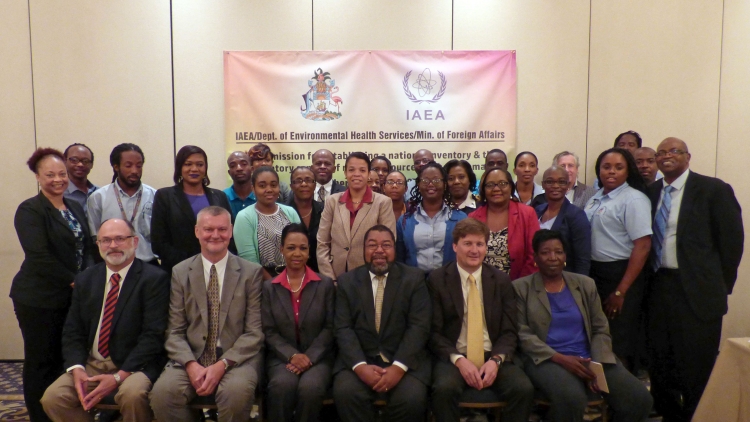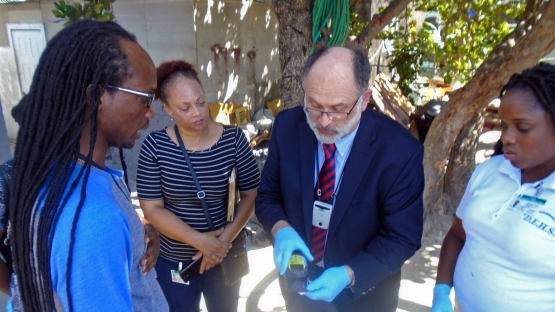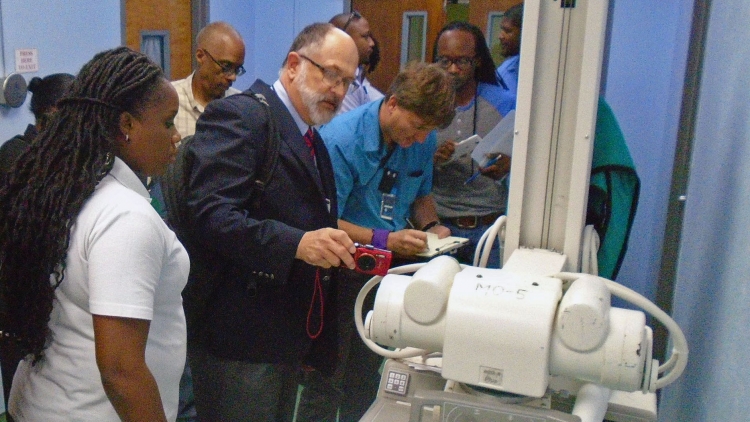Improving Radiation Safety in the Caribbean: IAEA Expert Mission Helps the Bahamas Build National Inventory of Radiation Sources
In October 2017, three IAEA experts conducted a mission on radiation safety in the Bahamas. The mission, carried out within the framework of an ongoing regional technical cooperation project[1], aimed to comprehensively assess the country’s regulatory infrastructure and to support the creation of a national inventory of radiation sources.
The IAEA team, together with Bahamian specialists, visited 12 medical and industrial sites, including Doctors Hospital, the Center for Specialized Dentistry, and Cancer Care Bahamas, to categorize on-site radiation sources. The team also delivered a workshop on ionising radiation, met with interim regulatory body representatives, and reviewed radiation safety laws, regulations, and processes to identify gaps and provide recommendations for addressing them.
 At the opening of the three-day workshop, the Bahamas’ Permanent Secretary of the Ministry of Environment and Housing Janice Miller acknowledged her country’s close cooperation with the IAEA. “Designation of a regulatory body and its operation – that is, authorisation, licensing, inspection and enforcement, radiation and nuclear protection and safety, safeguards, emergency preparation and response, transportation of radioactive material, import and export, radioactive nuclear waste storage and nuclear liabilities – at each phase, the IAEA will be consulted for guidance to ensure that our obligations as a member are met. The activities of the IAEA experts and local team will assist in establishing and maintaining a national inventory on radiation sources, inform the process of our efforts and, ultimately, lead to the appropriate regulation.”
At the opening of the three-day workshop, the Bahamas’ Permanent Secretary of the Ministry of Environment and Housing Janice Miller acknowledged her country’s close cooperation with the IAEA. “Designation of a regulatory body and its operation – that is, authorisation, licensing, inspection and enforcement, radiation and nuclear protection and safety, safeguards, emergency preparation and response, transportation of radioactive material, import and export, radioactive nuclear waste storage and nuclear liabilities – at each phase, the IAEA will be consulted for guidance to ensure that our obligations as a member are met. The activities of the IAEA experts and local team will assist in establishing and maintaining a national inventory on radiation sources, inform the process of our efforts and, ultimately, lead to the appropriate regulation.”
Following the expert mission, and guided by the IAEA experts’ recommendations, the Bahamas has continued to create a national inventory of radiation sources. Work has been completed on the island of New Providence, and the IAEA’s Regulatory Authority Information System (RAIS) server and software are being procured. The country is also better equipped to develop specific radiation safety legislation and establish a dedicated regulatory body responsible for radioactive source control.
The Bahamas has previously participated in the IAEA School for Drafting Regulations on Radiation Safety for IAEA Member States from the Caribbean in January 2017, where an initial draft regulation on radiation and radioactive waste safety was produced. In September 2017, Bahamian radiation safety licensing specialists also attended a regional training course in Canada, entitled Implementation of a National Regulatory Programme for the Control of Radiation Sources. This training provided Bahamian officials with fundamental knowledge and skills for authorisation, inspection and enforcement in medical, industrial, and research uses of ionising radiation.

Opening session of the IAEA expert mission to the Bahamas. (Photo: Bahamian Department of Environmental Health Services)
RLA9081 “Strengthening Cradle-to-Grave Control of Radioactive Sources”. Components of this regional technical cooperation project are funded through the IAEA’s Technical Cooperation Fund, and through extrabudgetary contributions from the United States of America.


